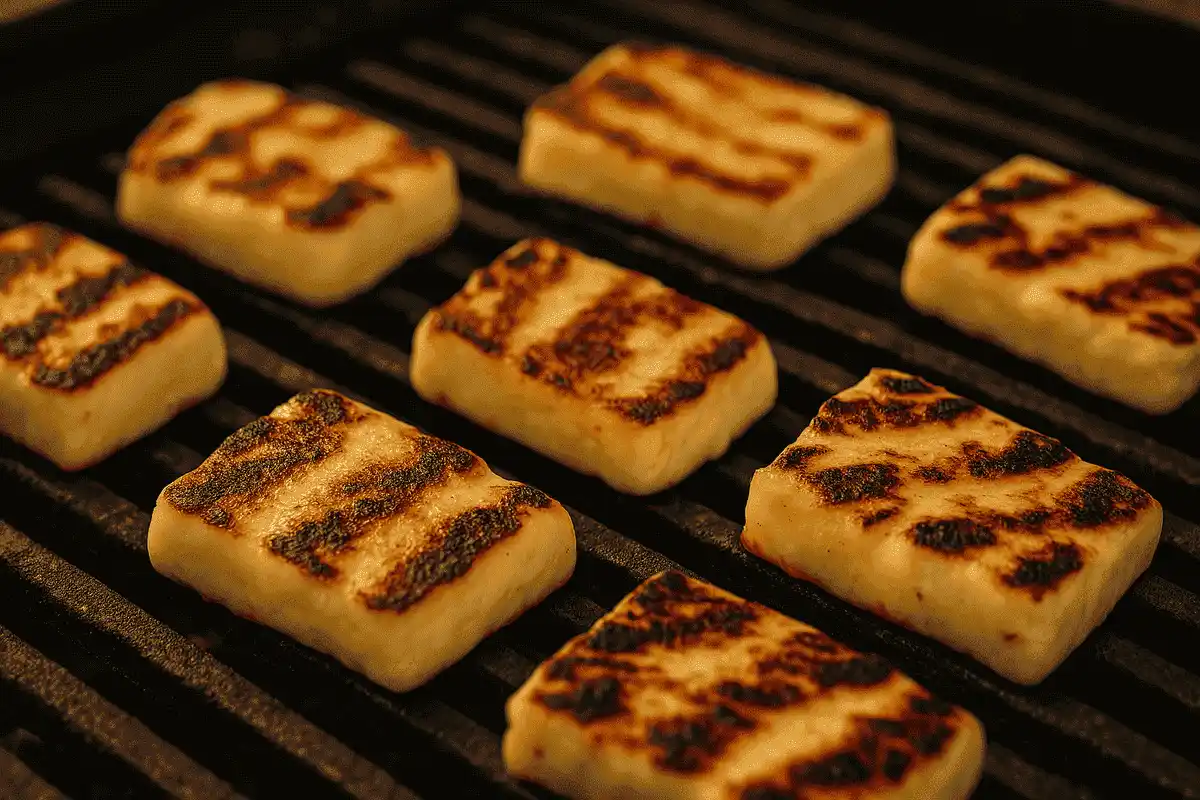Grilling cheese is a culinary delight known for its ability to hold its shape when cooked over high heat. Unlike many cheeses that melt into a gooey mess, grilling cheese maintains a firm, crispy exterior with a soft, chewy interior.
From the popular Halloumi grilling cheese of Cyprus to the rich, creamy Brazilian grilling cheese, this versatile cheese category offers a world of flavor and texture. Whether you’re enjoying Greek grilling cheese with a squeeze of lemon or experimenting with innovative options like Daiya grilling cheese for a plant-based experience, the possibilities are endless. Add in favorites like Mexican grilling cheese, and it’s easy to see why grilling cheese is gaining popularity worldwide.
Finding the best cheese for grilling can be a matter of taste, but with so many options to explore, there’s something for everyone—including vegan grilling cheese enthusiasts.
Quick Snapshot
- Origin: Global (Popular varieties include Cyprus, Greece, Brazil, Mexico, and various plant-based options)
- Texture: Firm, semi-soft to semi-hard, with a high melting point
- Flavor: Ranges from mild and creamy to salty and savory depending on the type
- Milk Type: Cow’s milk, sheep’s milk, goat’s milk, and plant-based options (like coconut oil and pea protein for vegan varieties)
- Fun Fact: Halloumi grilling cheese is one of the few cheeses that can be fried or grilled without melting, making it perfect for cooking directly over heat.
A Bite of History
Grilling cheese has been enjoyed for centuries in various cultures worldwide. The most famous example, Halloumi grilling cheese, originated in Cyprus and has been a staple of the Mediterranean diet since at least the Medieval era. Other cultures, such as Brazil and Mexico, have their own rich traditions of grilling cheese, each with distinct flavors and textures. As global cuisines continue to influence one another, these cheeses have become popular far beyond their countries of origin.
Taste & Texture
Grilling cheese is defined by its high melting point, allowing it to brown and crisp on the outside while maintaining a soft, chewy texture on the inside.
- Halloumi Grilling Cheese: Firm and slightly salty with a satisfying squeak when bitten. Its high moisture content keeps it chewy and tender even when grilled or fried.
- Greek Grilling Cheese (Saganaki): Often made from sheep’s milk or goat’s milk, it’s fried rather than grilled, resulting in a golden, crispy exterior and a rich, creamy interior.
- Brazilian Grilling Cheese (Queijo Coalho): Known for its mild, slightly salty flavor, it’s commonly enjoyed on skewers and cooked over open flames.
- Mexican Grilling Cheese (Queso Panela): Mild and creamy, it softens when grilled but retains its shape, perfect for slicing and frying.
- Daiya Grilling Cheese: A vegan grilling cheese made from plant-based ingredients, providing a creamy, satisfying alternative with a slight crisp when grilled.
Perfect Pairings
Grilling cheese pairs well with a variety of dishes and flavors. Here’s how to enjoy it best:
- Best with: Fresh vegetables, pita bread, fruit (like watermelon or figs), and roasted vegetables.
- Drink pairings: White wine, light beer, or sparkling water to cleanse the palate.
- Try it in: Salads, skewers, sandwiches, or served simply with olive oil and herbs.
Serving & Storage Tips
- Best way to serve: Grill or fry until golden brown, then serve hot. Cut into slices, cubes, or strips for appetizers, salads, or main dishes.
- How to store: Keep in an airtight container in the refrigerator. Some varieties, like Halloumi grilling cheese, can be frozen to prolong freshness.
- Shelf life: Fresh grilling cheese can last for up to two weeks in the refrigerator. Once grilled, consume within 2–3 days.
Nutrition Snapshot
- Calories per ounce: Varies by type, but generally around 80–100 calories per ounce for traditional cheese; 60–80 calories per ounce for vegan grilling cheese.
- Protein: Around 6–7 grams per ounce for traditional cheese; varies for vegan options.
- Fat: Roughly 6–8 grams per ounce for traditional cheese; plant-based options may contain less fat.
- Dietary notes: Most traditional grilling cheeses are gluten-free but not suitable for vegans. However, Daiya grilling cheese and other plant-based options provide a satisfying alternative.
Buying Tips
- How to pick the best version: Look for cheese that feels firm and moist with no signs of drying or cracking. Check the packaging for vegan grilling cheese if you prefer plant-based options.
- Recommended places to buy: Specialty cheese shops, grocery stores, and online retailers. Popular brands include Daiya grilling cheese for vegan varieties and various imported options for authentic Halloumi grilling cheese and Brazilian grilling cheese.
- What to avoid: Excessively dry cheese or those with an ammonia-like odor. Ensure vegan varieties are specifically labeled for grilling.
Bonus: Cheese Curious?
Have you tried combining different grilling cheeses for a multi-cultural grilling experience? Pair Halloumi grilling cheese with Greek grilling cheese (Saganaki) for a Mediterranean feast, or mix Brazilian grilling cheese with Mexican grilling cheese (Queso Panela) for a South American-inspired barbecue.
For plant-based enthusiasts, Daiya grilling cheese offers a creamy, delicious option that grills beautifully. From skewers to salads, the possibilities are endless.
Final Slice
Grilling cheese offers an exciting and versatile way to enjoy dairy—or a plant-based alternative. Whether you prefer the salty, chewy goodness of Halloumi grilling cheese, the mild creaminess of Brazilian grilling cheese, or the smoky flavor of Mexican grilling cheese, there’s a variety to suit every palate. Even vegan grilling cheese is rising in popularity, with options like Daiya grilling cheese providing a satisfying alternative for those who avoid animal products.
From appetizers and salads to sandwiches and skewers, the best cheese for grilling is ultimately the one that suits your taste buds. So why not fire up the grill and explore the delicious world of grilling cheese?

